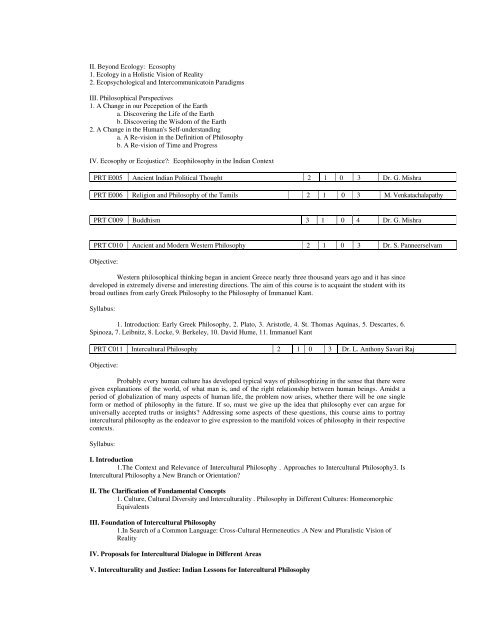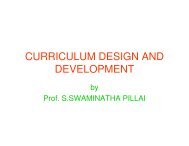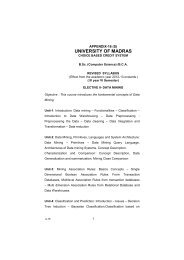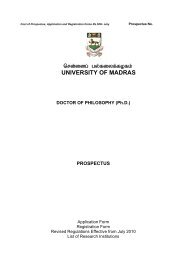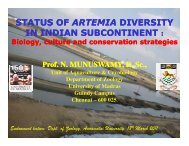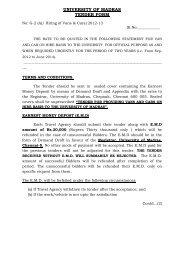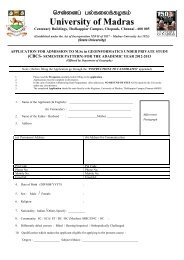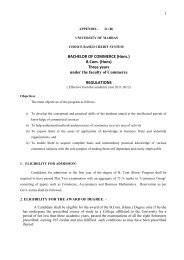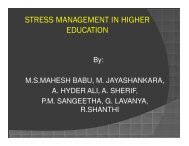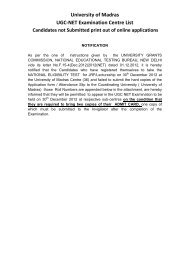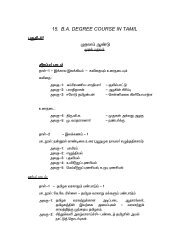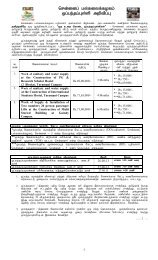II. Beyond Ecology: Ecosophy1. Ecology in a Holistic Vision <strong>of</strong> Reality2. Ecopsychological <strong>and</strong> Intercommunicatoin ParadigmsIII. Philosophical Perspectives1. A Change in our Pecepetion <strong>of</strong> the Eartha. Discovering the Life <strong>of</strong> the Earthb. Discovering the Wisdom <strong>of</strong> the Earth2. A Change in the Human's Self-underst<strong>and</strong>inga. A Re-vision in the Definition <strong>of</strong> <strong>Philosophy</strong>b. A Re-vision <strong>of</strong> Time <strong>and</strong> ProgressIV. Ecosophy or Ecojustice?: Ecophilosophy in the Indian ContextPRT E005 Ancient Indian Political <strong>Thought</strong> 2 1 0 3 Dr. G. MishraPRT E006 Religion <strong>and</strong> <strong>Philosophy</strong> <strong>of</strong> the Tamils 2 1 0 3 M. VenkatachalapathyPRT C009 Buddhism 3 1 0 4 Dr. G. MishraPRT C010 Ancient <strong>and</strong> Modern Western <strong>Philosophy</strong> 2 1 0 3 Dr. S. PanneerselvamObjective:Western philosophical thinking began in ancient Greece nearly three thous<strong>and</strong> years ago <strong>and</strong> it has sincedeveloped in extremely diverse <strong>and</strong> interesting directions. The aim <strong>of</strong> this course is to acquaint the student with itsbroad outlines from early Greek <strong>Philosophy</strong> to the <strong>Philosophy</strong> <strong>of</strong> Immanuel Kant.Syllabus:1. Introduction: Early Greek <strong>Philosophy</strong>, 2. Plato, 3. Aristotle, 4. St. Thomas Aquinas, 5. Descartes, 6.Spinoza, 7. Leibnitz, 8. Locke, 9. Berkeley, 10. David Hume, 11. Immanuel KantPRT C011 Intercultural <strong>Philosophy</strong> 2 1 0 3 Dr. L. Anthony Savari RajObjective:Probably every human culture has developed typical ways <strong>of</strong> philosophizing in the sense that there weregiven explanations <strong>of</strong> the world, <strong>of</strong> what man is, <strong>and</strong> <strong>of</strong> the right relationship between human beings. Amidst aperiod <strong>of</strong> globalization <strong>of</strong> many aspects <strong>of</strong> human life, the problem now arises, whether there will be one singleform or method <strong>of</strong> philosophy in the future. If so, must we give up the idea that philosophy ever can argue foruniversally accepted truths or insights? Addressing some aspects <strong>of</strong> these questions, this course aims to portrayintercultural philosophy as the endeavor to give expression to the manifold voices <strong>of</strong> philosophy in their respectivecontexts.Syllabus:I. Introduction1.The Context <strong>and</strong> Relevance <strong>of</strong> Intercultural <strong>Philosophy</strong> . Approaches to Intercultural <strong>Philosophy</strong>3. IsIntercultural <strong>Philosophy</strong> a New Branch or Orientation?II. The Clarification <strong>of</strong> Fundamental Concepts1. Culture, Cultural Diversity <strong>and</strong> Interculturality . <strong>Philosophy</strong> in Different Cultures: HomeomorphicEquivalentsIII. Foundation <strong>of</strong> Intercultural <strong>Philosophy</strong>1.In Search <strong>of</strong> a Common Language: Cross-Cultural Hermeneutics .A New <strong>and</strong> Pluralistic Vision <strong>of</strong>RealityIV. Proposals for Intercultural Dialogue in Different AreasV. Interculturality <strong>and</strong> Justice: Indian Lessons for Intercultural <strong>Philosophy</strong>
PRT C012 Sivajnanabodham 2 1 0 3 Dr. M. VenkatachalapathyPRT E007 <strong>Philosophy</strong> <strong>of</strong> Religion 2 1 0 3 Dr. R. GopalakrishnanPRT E008 Neo-Buddhism 2 1 0 3 Dr. G. MishraPRT S001 Self-study All FacultyPRT C013 Moral <strong>Philosophy</strong> 3 1 0 4 Dr. R. GopalakrishnanPRT C014 Naiskarmyasiddhi (First Chapter) 2 1 0 3 Dr. G. MishraPRT C015 Tractatus Logico-Philosophicus 2 1 0 3 Dr. S. PanneerselvamPRT C016 Contemporary Western <strong>Philosophy</strong> 2 1 0 3 Dr. L. Anthony Savari RajObjective:The purpose <strong>of</strong> this course is to give a brief presentation <strong>of</strong> the philosophy <strong>of</strong> western thinkers whoselives <strong>and</strong> reflections have indeed moulded our contemporary times. It will present the thinkers in terms <strong>of</strong> the mainschools, focusing attention one or two major representatives. The course also intends to make reflection <strong>and</strong>exchange on selected extracts from the major thinkers <strong>of</strong> the present-day western philosophical scene.Syllabus:1. Post-Kantian Idealism, 2. Positivism, 3. Pragmatism <strong>and</strong> Empirical Realism, 4. Logical Positivism <strong>and</strong>Analytic <strong>Philosophy</strong>, 5. Philosophies <strong>of</strong> Life <strong>and</strong> Phenomenology, 6. Structuralism, Post-Structualism <strong>and</strong>Hermeneutics, 7. Postmodernism.PRT C017 Hindu Social <strong>Philosophy</strong> 2 1 0 3 Dr. M. VenkatachalapathyPRT E009 Social <strong>and</strong> Political <strong>Philosophy</strong> <strong>of</strong> Dr.B.R. Ambedkar 2 1 0 3 Dr. M. VenkatachalapathyBharat Ratna' Dr. B. R. Ambedkar, was a great freedom fighter, Philosopher, Statesman, Writer, Orator,Constitutional expert, Educationist, Scholar albeit a veritable genius. And fought the whole <strong>of</strong> his life for thefreedom <strong>and</strong> uplift <strong>of</strong> the downtrodden, oppressed <strong>and</strong> suppressed classes. His struggle was against injustice <strong>and</strong>inequality in all spheres <strong>of</strong> life. He wanted equality in religious, social, economic <strong>and</strong> political matters for allclasses <strong>of</strong>fering them an opportunity to rise in life. Dr. Ambedkar was well aware that the major task is to alter theSocial Structure. He wanted equal status for women to spare them <strong>of</strong> the tyrannies <strong>and</strong> fortitudes <strong>of</strong> tradition.SYLLABUSUnit 1: Introduction: A short life sketch <strong>of</strong> Dr. B. R. Ambedkar; Philosophical background for Ambedkar'svision <strong>and</strong> mission; Buddhism as means to Social Revolution.Unit 2: Dr. Ambedkar's ideas on Vedic Social <strong>and</strong> Philosophical tradition; Sanadhana dharma – Varnashramadharma – Caste system as a Political power – who are the Sudras.Unit 3 :Social Justice <strong>and</strong> Right to Equality; Meaning <strong>and</strong> Concept <strong>of</strong> Social Justice <strong>and</strong> its historicalperspectives – Theories <strong>of</strong> Justice <strong>and</strong> Social Justice – Social Justice <strong>and</strong> Abolition <strong>of</strong> Untouchability –Social justice <strong>and</strong> Freedom <strong>of</strong> Religion – Concept <strong>and</strong> meaning <strong>of</strong> Equality – Social equality.Unit 4: Social justice <strong>and</strong> Right against Exploitation – Bonded Labour System – Social justice to Minority,Women, Children, Labour – Uniform civil code.Unit 5: Dr. Ambedkar's contribution to Indian Political <strong>and</strong> Constitutional thought – Role as a Chairman inConstitution drafting committee – Independency <strong>of</strong> Judiciary – Caste system <strong>and</strong> Parliamentarydemocracy <strong>and</strong> economic democracy – Social justice through reservation – Political <strong>and</strong> Social strategiesfor Dalit upliftment.PRT E010 Religion, Technology <strong>and</strong> Human Liberation 2 1 0 3 Dr. L. Anthony Savari RajObjective:While traditional religions claim to liberate people from bondage, modern technology purports also t<strong>of</strong>ree the human beings from the shackles <strong>of</strong> Nature. A study <strong>of</strong> the mutual relationship <strong>and</strong> critical analysis <strong>of</strong> bothclaims forms the subject matter <strong>of</strong> this course.Syllabus:


